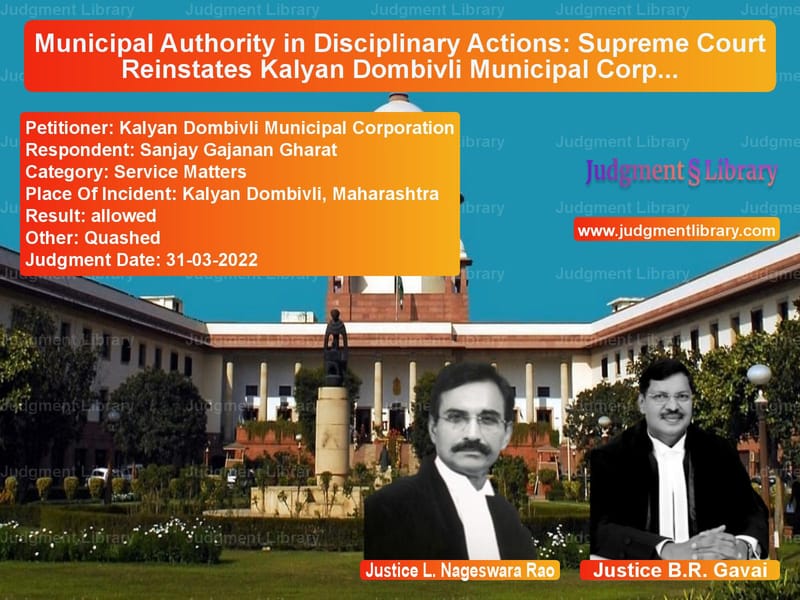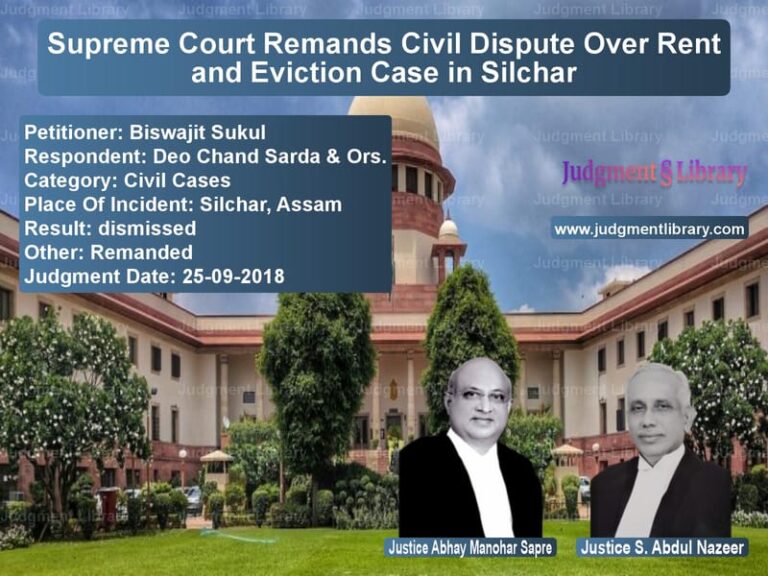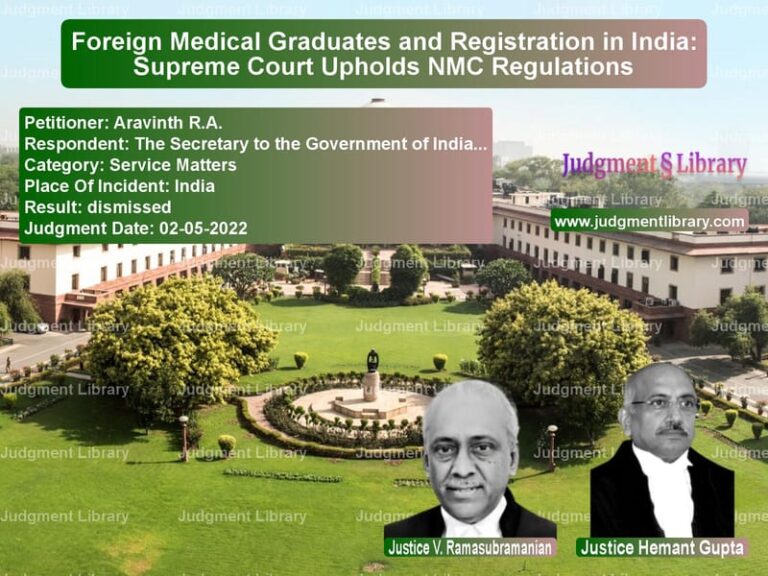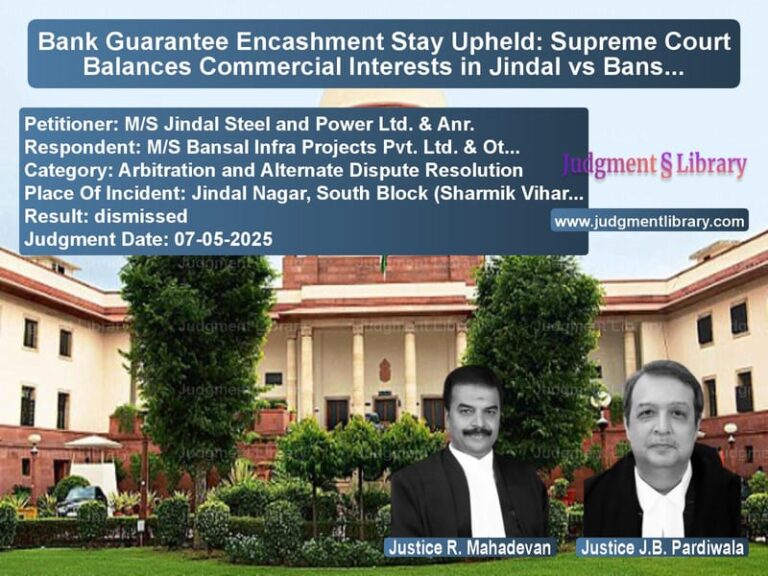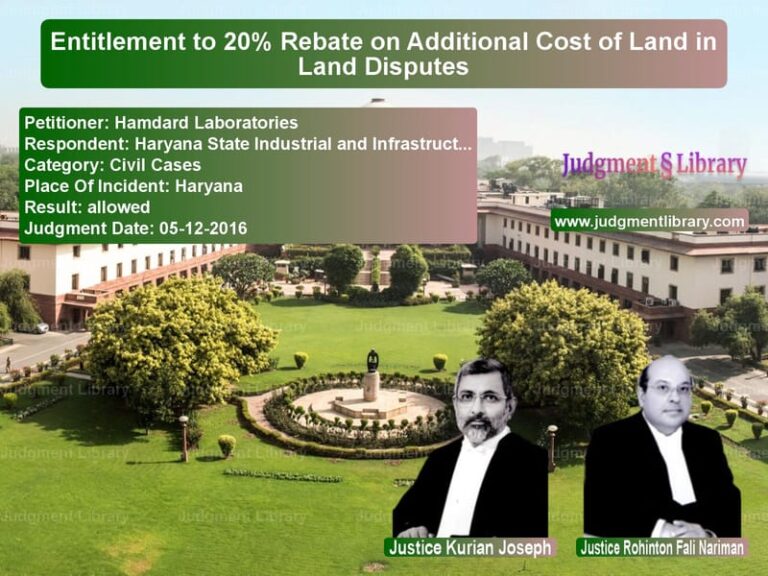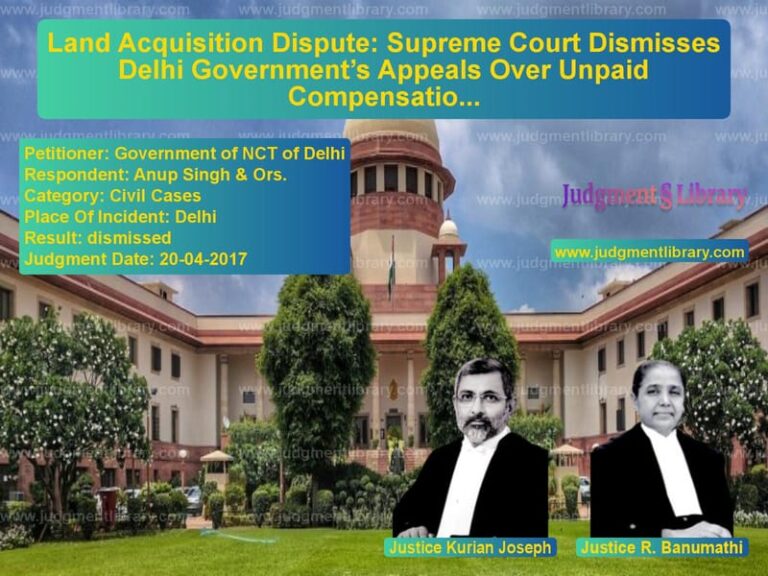Municipal Authority in Disciplinary Actions: Supreme Court Reinstates Kalyan Dombivli Municipal Corporation’s Power
The case of Kalyan Dombivli Municipal Corporation vs. Sanjay Gajanan Gharat revolves around the issue of whether the Kalyan Dombivli Municipal Corporation (KDM Corporation) had the authority to suspend and initiate disciplinary proceedings against its Additional Municipal Commissioner (AMC), or whether such powers lay exclusively with the State Government.
The Supreme Court ruled in favor of the KDM Corporation, overturning the Bombay High Court’s decision and upholding the corporation’s authority to act against its employees in cases of misconduct.
Background of the Case
The respondent, Sanjay Gajanan Gharat, was initially appointed as an Assistant Municipal Commissioner in 1995. He was later promoted to Deputy Municipal Commissioner in 2003, with the State Government’s approval coming in 2005. Following an amendment to the Maharashtra Municipal Corporations Act, 1949 (MMC Act), the State Government created the post of Additional Municipal Commissioner (AMC) for the KDM Corporation in 2011, to which Gharat was appointed in 2015.
On June 14, 2018, an FIR was registered against him under Sections 7, 8, 13(1)(d), and 13(2) of the Prevention of Corruption Act, 1988. He was arrested the same day and remained in custody until June 17, 2018, when he was granted bail.
Following his arrest, the Commissioner of the KDM Corporation, exercising powers under Section 56(1)(b) of the MMC Act and Rule 4(1) of the Maharashtra Civil Services (Discipline and Appeal) Rules, 1979, suspended Gharat on June 18, 2018. The General Body of the Corporation ratified his suspension on July 7, 2018, and later approved the initiation of a departmental inquiry against him.
In response, Gharat challenged his suspension and departmental inquiry before the Bombay High Court in Writ Petition No. 3599 of 2020, arguing that the KDM Corporation lacked the jurisdiction to take action against him. The High Court ruled in his favor, stating that the power to suspend and initiate inquiries against an AMC rested solely with the State Government, and ordered his reinstatement.
The KDM Corporation and the State of Maharashtra subsequently challenged this decision before the Supreme Court.
Arguments of the Petitioner (KDM Corporation)
The KDM Corporation, represented by Senior Counsel P.S. Patwalia, argued:
- While the State Government created the AMC post and made appointments under Section 39A of the MMC Act, the appointee became an employee of the municipal corporation.
- Section 56 of the MMC Act grants the municipal corporation the authority to suspend and initiate disciplinary proceedings against its officers.
- Gharat’s arrest and detention for over 48 hours triggered an automatic suspension under Rule 4(2) of the Maharashtra Civil Services (Discipline and Appeal) Rules, 1979.
- The High Court misinterpreted the law by relying on Section 16 of the Maharashtra General Clauses Act, 1904, instead of the specific provisions in the MMC Act.
Arguments of the Respondent (Sanjay Gajanan Gharat)
Gharat, represented by Senior Advocate Anupam Lal Das, countered:
- Since he was appointed by the State Government under Section 39A of the MMC Act, only the State Government had the power to suspend and initiate disciplinary action against him.
- The post of AMC was similar to that of a Municipal Commissioner, who is appointed under Section 36 of the MMC Act and can only be disciplined by the State Government.
- Section 56 of the MMC Act, which grants suspension powers to the municipal commissioner, does not apply to an AMC, as the provision is found in a different chapter of the Act.
- The prolonged suspension violated his rights, as laid out in Ajay Kumar Choudhary v. Union of India and State of Tamil Nadu v. Promod Kumar, which state that suspensions cannot be indefinite.
Supreme Court’s Observations
The Supreme Court, comprising Justices L. Nageswara Rao and B.R. Gavai, made several key observations:
- While the State Government appoints AMCs, they are appointed to serve specific municipal corporations and function under the control of the municipal commissioner.
- Under Section 56 of the MMC Act, the municipal commissioner has the authority to suspend and initiate disciplinary proceedings against officers, including those equivalent to or higher than an Assistant Municipal Commissioner.
- The High Court erred in interpreting the law by ignoring Section 56, which explicitly empowers the municipal corporation to take disciplinary action.
- Gharat’s continued suspension was due to his own refusal to participate in departmental inquiries, preventing the proceedings from concluding.
The Court emphasized:
“The legislature could not have intended a situation where an AMC, who is an employee of the municipal corporation, could evade disciplinary proceedings entirely due to a jurisdictional gap.”
Supreme Court’s Verdict
On March 31, 2022, the Supreme Court ruled:
- The Bombay High Court’s judgment was set aside.
- Gharat’s suspension was upheld, and the departmental proceedings against him were reinstated.
- The proceedings must be completed within four months, and Gharat would remain under suspension until their conclusion.
The Court concluded:
“The interpretation that an AMC cannot be disciplined by the municipal corporation is legally unsound and creates an absurdity. The powers under Section 56 of the MMC Act are sufficient to take action against municipal officers.”
Conclusion
The Supreme Court’s ruling reinforces several legal principles:
- Municipal authority in disciplinary actions: Municipal corporations have the power to suspend and discipline officers, even if appointed by the State Government.
- Preventing administrative loopholes: The decision closes potential loopholes that could allow municipal officers to evade accountability.
- Balancing employee rights and governance: While prolonged suspensions are discouraged, officers cannot use technicalities to avoid proceedings.
The ruling ensures that municipalities retain the ability to maintain discipline within their ranks while respecting due process.
Petitioner Name: Kalyan Dombivli Municipal Corporation.Respondent Name: Sanjay Gajanan Gharat.Judgment By: Justice L. Nageswara Rao, Justice B.R. Gavai.Place Of Incident: Kalyan Dombivli, Maharashtra.Judgment Date: 31-03-2022.
Don’t miss out on the full details! Download the complete judgment in PDF format below and gain valuable insights instantly!
Download Judgment: kalyan-dombivli-muni-vs-sanjay-gajanan-ghara-supreme-court-of-india-judgment-dated-31-03-2022.pdf
Directly Download Judgment: Directly download this Judgment
See all petitions in Disciplinary Proceedings
See all petitions in Termination Cases
See all petitions in Public Sector Employees
See all petitions in Judgment by L. Nageswara Rao
See all petitions in Judgment by B R Gavai
See all petitions in allowed
See all petitions in Quashed
See all petitions in supreme court of India judgments March 2022
See all petitions in 2022 judgments
See all posts in Service Matters Category
See all allowed petitions in Service Matters Category
See all Dismissed petitions in Service Matters Category
See all partially allowed petitions in Service Matters Category

